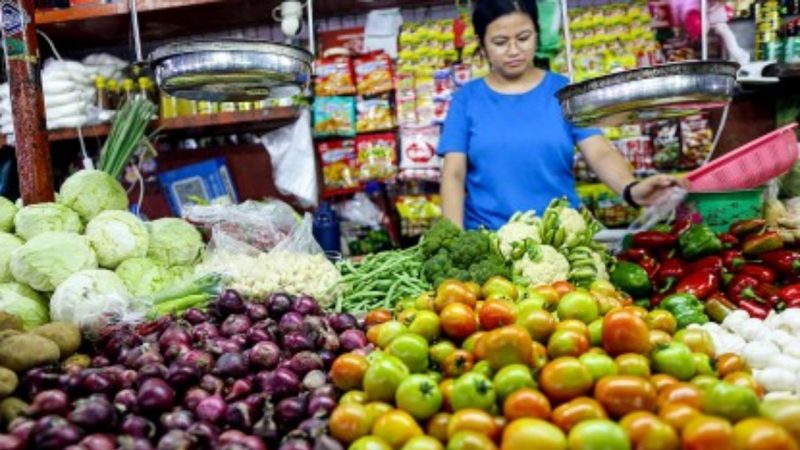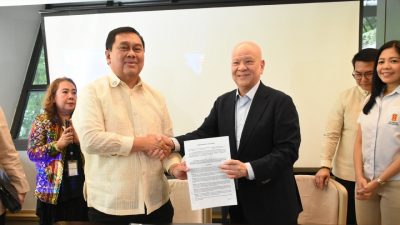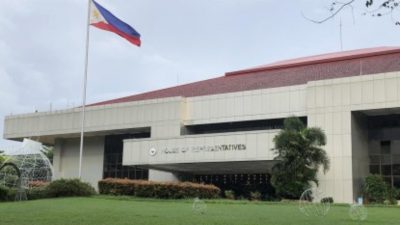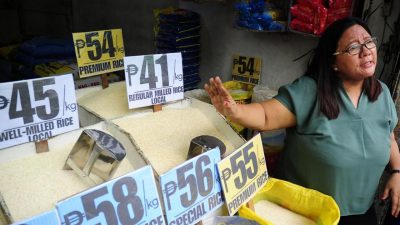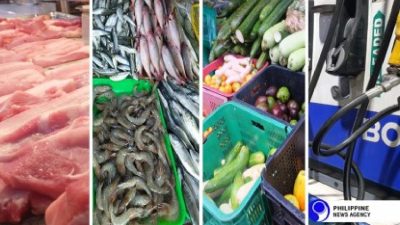MANILA – Headline inflation accelerated to 5.3 percent in August from 4.7 percent in July, the Philippine Statistics Authority (PSA) reported on Tuesday.
Last month’s inflation however was lower than the 6.3 percent recorded in August last year.
In a briefing, National Statistician Dennis Mapa said the uptrend was mainly due to the higher year-on-year increase in the heavily weighted food and non-alcoholic beverages at 8.1 percent in August from 6.3 percent in July this year.
Core inflation, which excludes volatile oil and food items, however, was down to 6.1 percent from 6.7 percent in July.
Mapa said the main contributor to the higher inflation of food and non-alcoholic beverages was the faster increase in the prices of cereal and cereal products, particularly rice with an inflation of 8.3 percent from 5.9 percent in July; vegetables, tubers, cooking bananas, and tomatoes (31.9 percent inflation from 21.8 percent); and fish and other seafood (6.9 percent from 4.5 percent).
For rice alone, inflation surged to 8.7 percent in August from 4.2 percent in July.
The annual growth of transport at 0.2 percent during the month, from -4.7 percent in July 2023, also contributed to the uptrend.
Year-to-date headline inflation stood at 6.6 percent, still outside the Bangko Sentral ng Pilipinas’ 2 percent to 4 percent target range.
Inflation in the National Capital Region (NCR) accelerated to 5.9 percent in August from 5.6 percent in July.
For areas outside the NCR, overall inflation also quickened to 5.2 percent from 4.4 percent the previous month.
Inflation for the bottom 30 percent of households, meanwhile, increased to 5.6 percent from 5.2 percent in July this year.
In a statement, the National Economic and Development Authority (NEDA) said the government would strengthen its measures to ensure food security, protect consumers and provide assistance to farmers.
“Despite the ongoing challenges we encounter, such as severe weather conditions and trade limitations imposed by other nations, our objective remains to achieve an inflation rate between 2 (percent) and 4 percent by the year’s end,” NEDA Secretary Arsenio Balisacan said.
Balisacan said the expected reduction in rice production due to El Niño and the export ban recently imposed by major rice exporters, such as India and Myanmar, led to higher international rice prices.
He added that the alleged hoarding incidents, artificial shortage and speculative business decisions of market players may have put further upward pressure on the domestic retail price of rice.
Balisacan cited the importance of providing comprehensive assistance to rice and vegetable farmers to help them raise their production.
He added that the Department of Agriculture and the National Food Authority should augment support to farmers in the drying and milling of palay in the upcoming harvest season.
NEDA also recommended the faster implementation of programs to facilitate the swift recovery of production in typhoon-affected areas.
Balisacan said the government also needs to accelerate the Food Stamp Program rollout, which would provide PHP3,000 worth of food credits to target beneficiaries each month for six months.
The DSWD will provide PHP15,000 to small-scale rice retailers affected by Executive Order No. 39 through the Sustainable Livelihood Program, Balisacan said.
The government will also provide assistance in transporting rice sacks from farmer cooperatives and traders to retailers and wholesalers.
The Office of the President will augment the funding needed to ensure assistance to retailers.
Other government support to consumers includes the continued implementation of Kadiwa stores, targeted cash transfers and the Department of Trade and Industry’s (DTI) Diskwento Caravan.
Balisacan also called for a review of the existing tariff levels on rice to help reduce the cost of this staple for consumers while considering the impact of this intervention on local producers.
“To partially counterbalance the rise in global prices and alleviate the impact on consumers and households, we may implement a temporary and calibrated reduction in tariffs,” he said.
To ensure the availability of affordable food and reduce transport costs, President Ferdinand R. Marcos Jr. recently approved the three-year food logistics action agenda of the DTI.
The program aims to ensure available, accessible and affordable food for consumers by upgrading food terminals and developing an efficient logistics system.
“Using policy levers on multiple fronts, we are confident in our ability to overcome the obstacles arising from domestic and international factors as we safeguard the interests of Filipino consumers and producers,” Balisacan said. (PNA)

